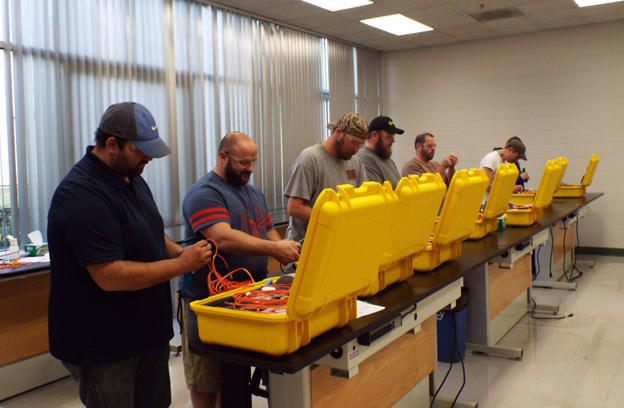Preparing Workers for Emerging Careers in Kentucky's Post-Coal World
January 23, 2018
By Mai P. Tran, ECMC Foundation

A man in his late 30s stood in front of a large bulletin board at a local community college. Looking at the many flyers about the programs offered at the campus, he felt lost. After being laid off from a disappearing industry in the region, he wondered what his future held.
For generations, men in his family worked in Kentucky's once-thriving coal mining industry. Its decline left behind a trail of unemployed adults with few skills for other careers. Since the 1980s, the coal industry has lost two-thirds of its jobs in the U.S. with eastern Kentucky taking the biggest hit. Today, there are only 3,896 workers employed by the industry in the region, down from 13,679 in 2011. Some are migrating to different states, while others are considering potential career shifts.
In response, local community organizations, businesses and community colleges, including Southeast Kentucky Community and Technical College (Southeast), began looking for innovative ways to transform the economy. The community college felt uniquely positioned to support those displaced by the dying industry, noting that many good, family-sustaining careers can be accessed with sub-baccalaureate career and technical education (CTE) programs. But the campus also acknowledged that fewer than half of the students entering CTE programs complete and graduate, often due to the fact that many students lack the English and/or math skills necessary to test out of remediation, let alone complete the technical course work. A lack of adequate academic and career advising and support services, often coupled with unclear and disconnected career pathways, also impacts persistence.
That's when Southeast decided to contact Jobs for the Future (JFF), a national nonprofit that works to ensure that all low-income young people and workers have the skills and credentials needed to succeed in our economy. Southeast's leadership was familiar with JFF's Accelerating Opportunity (AO) model, which features integrated instruction combining basic skills delivery with technical training, enhanced student supports, and stackable credentials that are aligned to labor market needs and lead to jobs with family-supporting wages.
Looking to build pathways into emerging careers in the region, Southeast applied to be part of the next phase of the successful program. Known as Accelerating Career and Technical Education (Accelerating CTE), the refined program is built on the core elements of the AO model, including team teaching between an academic skills instructor and a CTE instructor.
Through a competitive process, Southeast was selected as one of five community colleges in Kentucky and Kansas to participate in Accelerating CTE. In addition to team teaching, each college made a commitment to implement a variety of elements designed to improve student persistence beyond the first credential, such as stronger career advising, earn-and-learn strategies, flexible course schedules, improved access to financial aid, and working with employers to design and implement strategies that support working students as they balance employment with continued education and training.
"A number of factors have drained coal mining jobs, including the growth of renewable energy and tougher federal environmental regulations," said Sherri Clark, the college's director of workforce solutions. "To thrive, we must think toward the future. Where will jobs grow in the 21st century? And how can we help prepare Kentuckians?"
Southeast also addressed the issue of a changing regional economy by partnering with Kentucky WIRED, the largest infrastructure project in Kentucky. With guidance from JFF and in collaboration with Kentucky WIRED, Southeast launched a program that trains students in the latest fiber-optics technologies. The project with Kentucky WIRED will bring reliable and affordable internet to the state, which ranks lowest in the country for broadband access. It is expected to attract more jobs, grow local businesses and expand educational opportunities. To date, Southeast has trained more than 140 fiber optics professionals, many of whom are former coal miners.
When Southeast President and CEO Dr. Vic Adams saw the 30-year-old man staring at the bulletin board at his campus, he encouraged him to enroll in the fiber optics program. That year, the student graduated with credentials and skills to begin his new fiber optics career. At his graduation ceremony, he told Dr. Adams the program "helped him find hope."
"I have seen an overabundance of under-skilled adults who face challenges that are insurmountable without assistance," said Dr. Adams. "It is rewarding to see apprehensive, scared and intimidated people, who after a short time [in our programs] excel, receive their credentials and have a life-changing experience."
In addition to the fiber optics training program, the campus launched several allied health programs. The decision to develop a new program is made only after a careful analysis of the local market. Dr. Adams says the campus works with Eastern Kentucky Concentrated Employment Program to "secure employer and market sector data." Southeast also has created critical partnerships with employers.
"We have formed alliances with businesses who hire our graduates," Dr. Adams says. "These relationships have helped us increase and fast-track student success."
In addition to Southeast, other colleges participating in Accelerating CTE are West Kentucky Community and Technical College, and Seward County, Hutchinson and Neosho Community Colleges in Kansas. These colleges are all committed to improving educational and economic opportunities for underprepared learners. Some of the integrated career pathways they are building include healthcare, welding and commercial driver's license, among several other in-demand programs.
Did you enjoy this grantee spotlight? Read more grantee spotlights here.
